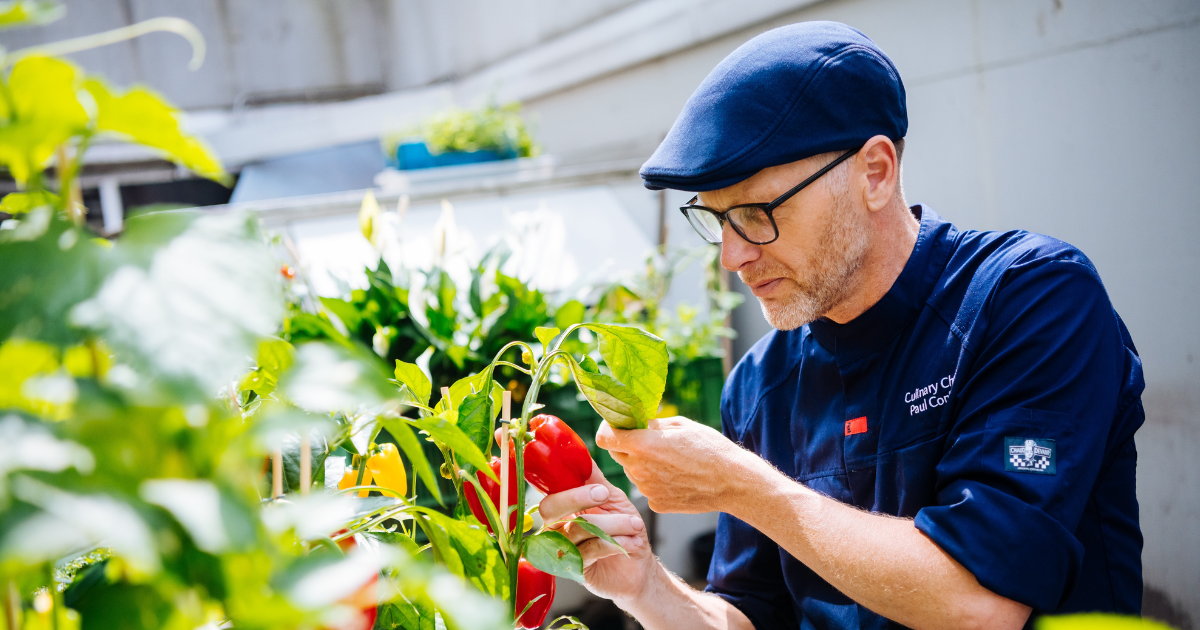The plant-based menu has matured
 Paul Conijn
Paul ConijnAs the demand for vegetarian and vegan options during events increases, culinary chef Paul Conijn is working with executive chef Rientz Mulder on further refining the RAI’s plant-based range. In this blog Paul explains that there’s so much more to offer than the usual quinoa salad as the RAI serves up fully fledged culinary dishes. Guests are often surprised, and plant-based food stands often end up being the most popular.
Why?
At the RAI we are increasingly asked by organisers to develop a menu with vegetarian and vegan options. This enables them to meet the wishes of their guests among whom demand for these products continues to grow. As the attendees at large international events are very diverse we always take various dietary wishes into account. There may be people who are lactose intolerant or choose to eat halal or kosher food. As we can fulfil nearly all these wishes by serving vegetarian cuisine, we keep it simple and develop plant-based dishes that meet all dietary requirements at the same time.
In addition, all major events are looking to minimise their CO2 footprint and report on their performance. We see it as a professional achievement to always deliver a tasty, attractive, healthy and sustainable menu – and plant-based food offers us plenty of options to realise this.”
Always hybrid
Although we have provided various events with full plant-based catering, it is generally part of a hybrid menu. We don’t want to force anything, but we do want to provide options. For the dishes that include animal products we also strive to include the most sustainable options. Our Heartwarming Amsterdam concept, which we have been applying for many years, works with local growers, goat farmers, cheesemakers, a sustainable fishery business and a care farm for our eggs. And we mainly use seasonal products, which also contributes to the overall sustainability. Moreover, these companies have a social function, and we enjoy working with suppliers on a personal level.
Balanced and tasty
Innovation in the vegetarian cuisine arena has developed rapidly over the last decade and we want to be a front-runner in that regard. We’re no longer excited by dishes such as hummus wraps and quinoa salads. We also rarely use meat substitutes. We prefer vegetable-based solutions: adding mushroom to create the right structure in vegetarian snacks rather than pieces of ‘fake meat’. And when we suggest a vegetarian burger, it could easily be a delicious, crispy slice of celeriac. People who taste it are often pleasantly surprised.
One of our main sources of inspiration is Indian cuisine, which is by tradition largely vegetarian and features ingredients like beans, lentils and tofu… And those wonderful spices of course! Because the visual aspect is important, too, we like to make dishes extra appealing. The herbs and flowers from our own vertical greenhouse are a great asset in this respect.
Sustainable concepts
Finally, we shouldn’t forget that it is also important to waste as little food as possible. The old-fashioned buffets, which always resulted in lots of leftovers, are no longer relevant. We prefer to work with street-food options, where dishes are prepared quickly on site. A served lunch or walking dinner also prevents waste as it is much easier to plan what to buy. Ingredients that end up not being used are carried over to the next day or used in different recipes. The last and maybe best option is donating leftover food to the Food Bank or using it to prepare meals for social organisations such as homeless shelters.
Tasting is believing
When an event does have a plant-based range this is generally very popular. Even people who indicated that they don’t want to eat vegan often end up trying something. Sometimes it is the most popular food concept of an event. Unfortunately, I do still see some trepidation when organisers start with plant-based products. That’s why we organise tastings for most large events so that the organisers can sample items for themselves. This helps convince them of the quality and flavours, while our presence as chefs helps build confidence: we can answer any questions directly, adapt things where necessary and ensure 100% quality.
I would recommend everyone start including a plant-based range as an option in their menu. You’ll see that the response will be very positive and it will directly reduce the CO2 footprint of your event.”
Like to know which plant-based options we could offer your event? We would be pleased to discuss the possibilities.
Contact
